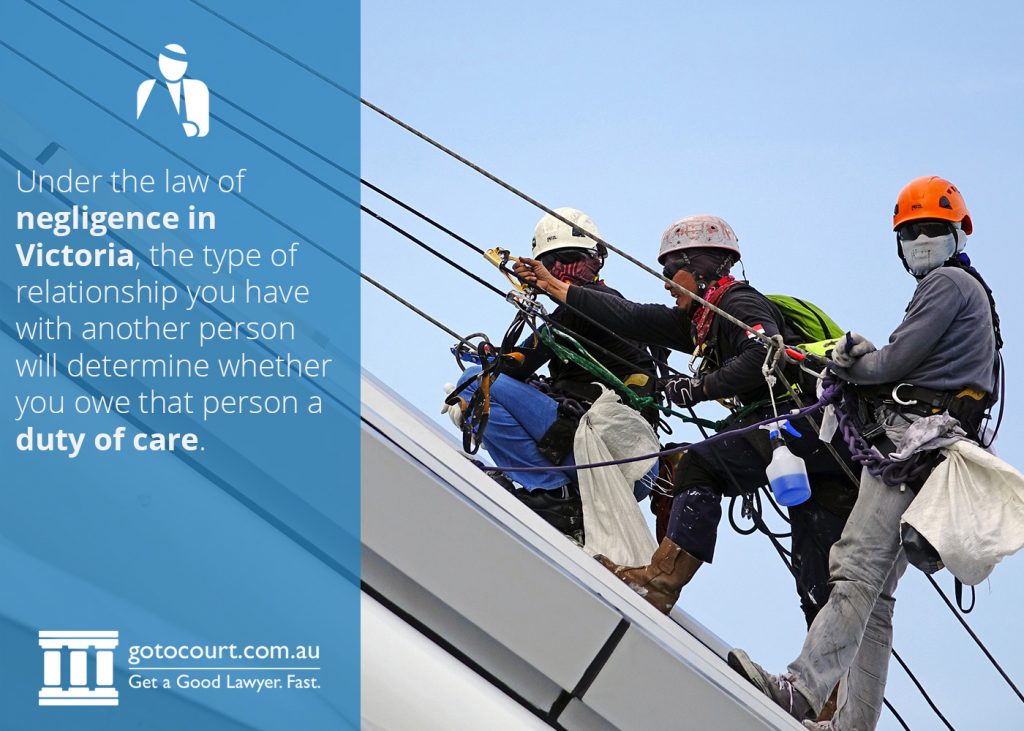Negligence in Victoria
Negligence in Victoria
The tort of negligence in Victoria is regulated by both the Wrongs Act 1958 (Vic) and case law (also referred to as common law).
Simply put, negligence is defined as the failure to exercise reasonable care and skill. A person can be negligent in the way they do something, or in failing to do something. For such acts or failures to act to become legal matters, the conduct must have resulted in some harm to a person to whom the negligent party owed a duty of care.
Negligence elements
To make a claim for negligence in Victoria, three different elements must be proved on the balance of probabilities:
- The negligent party must have owed you a duty of care;
- They must have somehow breached their duty; and
- You must have suffered some harm as a result of the breach of the duty of care.
Who owes a duty of care?
Whether or not a person owes a duty of care depends on the existence of a particular kind of relationship between the parties. There are some established categories that the court will readily accept as imposing a duty of care. However, the list of relationships is not closed and may extend beyond what has been commonly accepted.

Some examples of established categories include the relationships between the following:
- Land owner and tenant;
- Occupier of land and visitor to the land;
- Teacher and their student;
- Doctor and their patient;
- A manufacturer and the consumer;
- Employer and their employee; and
- A road user and another road user.
When does a duty of care arise?
A duty of care generally exists when there is some reasonably foreseeable risk of harm occurring to another person. When the harm is foreseeable, then the negligent party must take reasonable care to ensure the harm does not occur.
Generally, a negligent party will be required to act in a way that a ‘reasonable person’ would in the same position. This is called the ‘standard of care’ which must be proved in a case of negligence in Victoria. Where that standard of care is not maintained, a breach of duty will have occurred.
The type of relationship dictates the standard of care. The standard is determined by reference to what a reasonable person in that same position would have done. For instance, the standard of care a doctor has for their patient when performing a medical procedure would be higher than the standard of care an owner has towards their tenant.
The court takes into account the particular circumstances surrounding each case to determine what would have been reasonable in each particular situation.
Breach of duty of care
When the standard of care is not met, a breach of duty has occurred.
A person will not be negligent unless the following is proved:
- The harm or damage occurring was foreseeable;
- The risk was not far-fetched or fanciful; and
- A reasonable person in those same circumstances would have taken steps to ensure the risk did not arise.
Whether a breach has occurred will depend on the particular circumstances of each case.
In deciding if a reasonable person would have taken precautions, the court will consider the following factors:
- The probability that harm would occur if the person did not exercise their duty;
- How serious the harm was likely to be;
- The burden to take steps to avoid the risk of harm on the negligent party; and
- How much the (dangerous) activity is useful for beneficial to society.
Harm caused
The third element that must be proven for a successful claim of negligence in Victoria is demonstrating that there was harm caused as a result of the negligence.
Harm can include the following:
- An injury to the person themselves, both physically and psychologically;
- Economic loss; or
- Damage to the person’s property.
The person making the claim for negligence must have experienced the harm themselves. For example, in a teacher and student relationship the harm must have been caused to a particular student. It cannot have been caused to a third party, such as the student’s parent.
The harm must also have been caused by the breach and not some other reason.
Making a claim of negligence in Victoria
A negligence claim can be made by a person who has suffered harm as a result of a breach of duty of care. They must lodge an application in the relevant Victorian court. In making the application, you should first seek the assistance of a legal practitioner to ensure the best possible outcome.
What might the claimant be awarded if successful?
Monetary compensation is the most common outcome for victims of negligence in Victoria.
The facts of the case determine how much the court will grant. Often the determination of compensation forms a large part of the court’s determination of a negligence claim.
Various factors can be taken into account, including the following:
- The effect of the loss or injury on the person’s future ability to earn;
- Whether the claimant was engaging in illegal activity at the time;
- The extent of personal injury;
- Whether the claimant was intoxicated by drugs or alcohol;
- The amount of financial loss suffered;
- The extent of damage to personal property; and
- What kind of personal property was damaged, such as whether it is easily replaceable or if it was a rare item.
If a person has contributed to their own harm (often called contributory negligence), the court must take this into account when determining their entitlement to damages. The amount awarded will be reduced in proportion to their contribution to the harm.
If the breach is continuing, an injunction may be granted to prevent a person from engaging in the conduct.
Time limits for making a claim of negligence in Victoria
The Limitation of Actions Act 1958 provides the time limits in which a person can make a claim of negligence in Victoria.
A claim for negligence must be commenced either:
- Within three years of the discovery of the cause of action by the party eligible to claim; or
- Within 12 years from the date of the act or omission which resulted in the injury.

Affordable Lawyers
Our Go To Court Lawyers will assist you in all areas of law. We specialise in providing legal advice urgently – at the time when you need it most. If you need a lawyer right now, today, we can help you – no matter where you are in Australia.How It Works




1. You speak directly to a lawyer
When you call the Go To Court Legal Hotline, you will be connected directly to a lawyer, every time.

2. Get your legal situation assessed
We determine the best way forward in your legal matter, free of charge. If you want to go ahead and book a face-to-face appointment, we will connect you with a specialist in your local area.

3. We arrange everything as needed
If you want to go ahead and book a fact-to-face appointment, we will connect you with a specialist in your local area no matter where you are and even at very short notice.


















